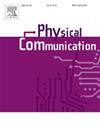Hybrid beamforming and phase shift optimization for energy efficiency with on-off control of RF chain and reflecting elements in 6G RIS-aided communications
IF 2
4区 计算机科学
Q3 ENGINEERING, ELECTRICAL & ELECTRONIC
引用次数: 0
Abstract
Reconfigurable Intelligent Surface (RIS) has emerged as a promising low-cost and energy-efficient solution for 6G wireless networks by enabling intelligent control of the wireless propagation environment. However, the energy consumption of RF chains and the large-scale deployment of reflecting elements remain critical challenges for practical RIS-assisted systems. In this paper, we propose a novel Beamforming and Phase-shift Optimization Framework (BPOF) that jointly optimizes hybrid beamforming, RIS phase shift design, and the on-off control of both RF chains and reflecting elements to enhance energy efficiency (EE) in downlink communications. The proposed BPOF scheme is applicable to both passive and active RIS architectures, where active RIS elements can amplify reflected signals to mitigate multiplicative fading effects. To address the non-convexity of the energy efficiency maximization problem, we adopt Dinkelbach’s method and quadratic transformation, combined with an alternating optimization strategy, to efficiently approximate the optimal solution. Simulation results demonstrate that the proposed BPOF scheme achieves a 1.04% improvement in energy efficiency compared to existing baseline approaches, highlighting its potential for future energy-efficient 6G RIS-aided communication systems.
混合波束形成和相移优化的能源效率与开关控制的射频链和反射元件在6G ris辅助通信
通过智能控制无线传播环境,可重构智能表面(RIS)已成为6G无线网络的一种有前途的低成本和节能解决方案。然而,射频链的能量消耗和反射元件的大规模部署仍然是实际ris辅助系统的关键挑战。在本文中,我们提出了一种新的波束形成和相移优化框架(BPOF),该框架联合优化混合波束形成、RIS相移设计以及RF链和反射元件的开关控制,以提高下行通信的能效(EE)。提出的BPOF方案适用于无源和有源RIS体系结构,其中有源RIS元件可以放大反射信号以减轻乘性衰落效应。针对能效最大化问题的非凸性,采用Dinkelbach方法和二次变换,结合交替优化策略,有效逼近最优解。仿真结果表明,与现有基准方法相比,所提出的BPOF方案的能源效率提高了1.04%,突出了其在未来节能6G ris辅助通信系统中的潜力。
本文章由计算机程序翻译,如有差异,请以英文原文为准。
求助全文
约1分钟内获得全文
求助全文
来源期刊

Physical Communication
ENGINEERING, ELECTRICAL & ELECTRONICTELECO-TELECOMMUNICATIONS
CiteScore
5.00
自引率
9.10%
发文量
212
审稿时长
55 days
期刊介绍:
PHYCOM: Physical Communication is an international and archival journal providing complete coverage of all topics of interest to those involved in all aspects of physical layer communications. Theoretical research contributions presenting new techniques, concepts or analyses, applied contributions reporting on experiences and experiments, and tutorials are published.
Topics of interest include but are not limited to:
Physical layer issues of Wireless Local Area Networks, WiMAX, Wireless Mesh Networks, Sensor and Ad Hoc Networks, PCS Systems; Radio access protocols and algorithms for the physical layer; Spread Spectrum Communications; Channel Modeling; Detection and Estimation; Modulation and Coding; Multiplexing and Carrier Techniques; Broadband Wireless Communications; Wireless Personal Communications; Multi-user Detection; Signal Separation and Interference rejection: Multimedia Communications over Wireless; DSP Applications to Wireless Systems; Experimental and Prototype Results; Multiple Access Techniques; Space-time Processing; Synchronization Techniques; Error Control Techniques; Cryptography; Software Radios; Tracking; Resource Allocation and Inference Management; Multi-rate and Multi-carrier Communications; Cross layer Design and Optimization; Propagation and Channel Characterization; OFDM Systems; MIMO Systems; Ultra-Wideband Communications; Cognitive Radio System Architectures; Platforms and Hardware Implementations for the Support of Cognitive, Radio Systems; Cognitive Radio Resource Management and Dynamic Spectrum Sharing.
 求助内容:
求助内容: 应助结果提醒方式:
应助结果提醒方式:


